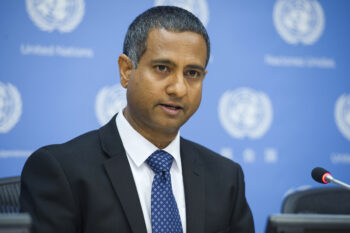
Humanists UK has called upon all states to make sure the school curriculum is critical, objective, and pluralistic, particularly in its approach to religions and humanism. This is necessary to safeguard the right to freedom of thought. Humanists UK made this call in response to a consultation issued by Dr Ahmed Shaheed, the UN Special Rapporteur on Freedom of Religion or Belief.
International human rights law includes the right to ‘freedom of thought, conscience, religion, or belief’. But, freedom of thought has been little considered in its own right.
Humanists UK said freedom of thought emcompasses much more than our private internal experiences. It is a skill set. The skill of being able to seek out, receive, comprehend, and evaluate information. Like any skill, it needs to be taught and developed.
States have a duty to create a culture in which freedom of thought and free enquiry can flourish. In practice, this means having laws that protect people from propaganda and misinformation. It also means schools must teach critical thinking skills. These skills include an understanding of the scientific method. It also means teaching in detail about different religions and humanism, but in a critical, objective, and pluralistic way. All citizens must have access to a wide variety of educational resources, whether that means through books, online, or by other means. And the media also has a strong role to play in informing and educating citizens – particularly public sector media. It must also make sure its content is pluralistic.
Humanists UK also called for the global repeal of blasphemy and apostasy laws. As freedom of thought is an absolute right, no one should be punished because they hold certain thoughts. Laws that criminalise apostatic or blasphemous thoughts are thus incompatible with this right.
Humanists UK’s Director of Public Affairs and Policy Richy Thompson commented,
‘Thought is not only a private experience. It is also a skill. Like any crucial skill, it needs to be taught and given the opportunity to develop. Thus, the state must ensure schools teach in a critical, objective, and pluralistic way. We are concerned that in the UK this is not being achieved. Religious education syllabuses still frequently exclude humanism. All state schools must conduct a daily act of compulsory worship – usually Christian in nature. And we are also aware of an increasing number of illegal religious schools. In these schools, the curriculum is extremely narrow, putting the children at risk of indoctrination. We need a society where all schools, the media, and public access to information is diverse and pluralistic.’
Notes:
For further comment or information, please contact Humanists UK Director of Public Affairs and Policy Richy Thompson at press@humanists.uk or phone 020 7324 3072 or 020 3675 0959.
Read the consultation response.
Read more about our education campaigns.
Read more about our international campaigns.
Humanists UK is the national charity working on behalf of non-religious people. Powered by 100,000 members and supporters, we advance free thinking and promote humanism to create a tolerant society where rational thinking and kindness prevail. We provide ceremonies, pastoral care, education, and support services benefitting over a million people every year and our campaigns advance humanist thinking on ethical issues, human rights, and equal treatment for all.
In 2021, Humanists UK is celebrating its 125th anniversary with a renewed focus on its history. The new website Humanist Heritage is a rich new web resource that uncovers the untold story of humanism in the UK – a story of people, groups, objects, places, movements, publications, and ideas.
